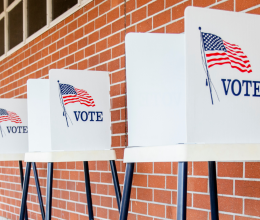By Jennifer Riley Collins, Executive Director
There were about 35 bills this legislative session that would have increased participation in the electoral process. Thirteen of them would have increased access to the voting booth through online registration or early no excuse voting, and four would have restored the right to vote to those who have paid their debt to society. Democrats and Republicans proposed these bills. There is a clear understanding that civic engagement and electoral participation are fundamental elements of our democracy.
Unfortunately, Mississippi’s elected elite failed to take action on these measures. Not one of them even made it out of committee to be debated on the floor of the House or Senate. This is yet another missed opportunity for Mississippi to get it right. One lone bill authorizing study of voting rights of felons who have served their sentences awaits Senate action this legislative session. The Senate should do what is right and, at a minimum, study the issue and find that no harm will be done to this state by restoring the right to vote.
As we near the end of Black History Month, it must be pointed out that many fear that allowing these measures to pass will increase African American voter participation and may, therefore, turn the tide once again on making Mississippi’s leadership look more like its diverse population. This same motivation resulted in the mid 1960’s legislation intended to nullify the black vote. This failure reflects poorly on the state.
The response by organizations and Mississippi citizenry to the legislature’s failure to consider these bills will likely lead to increased litigation. Litigation has served as a necessary tool used to bring about change, increase opportunity, and to demand what is right in Mississippi.
In the late 1960s, voters were forced to bring lawsuits to enforce provisions under the Voting Rights Act. The ACLU of Mississippi brought an action in 2008 for unconstitutionally denying voting rights to citizens with felony convictions. Mississippi Center for Justice brought a complaint in late 2017 against Mississippi officials on behalf of ex-felons who have been denied the right to vote upon reentering society due to a disenfranchisement provision in the 1890 Mississippi Constitution. It is likely that other cases will be filed in order that Mississippians who want to cast a ballot are able to do so. State leadership fails to realize that it is the taxpayers who ultimately bear the cost when they fail to act.
State legislators can protect the state against litigation by expanding access to the polls, including early voting, online voter registration, and same-day voter registration; avoiding at all cost voter suppression efforts; and by restoring voting rights. It’s time we get this right. It’s time we let people vote.




